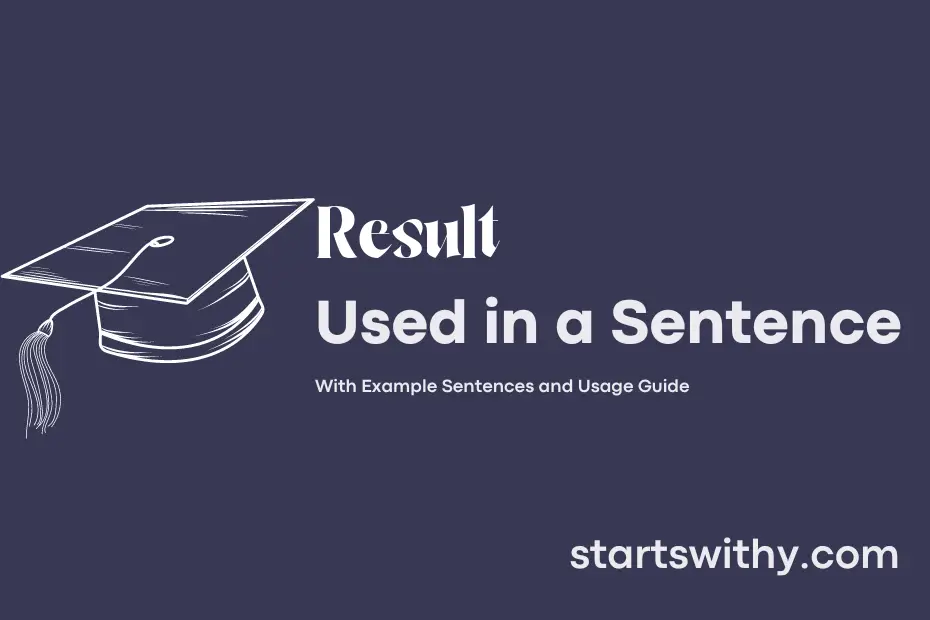Have you ever wondered how to use the term “result” in a sentence correctly? In grammar, the word “result” is often used to show the outcome or consequence of an action or a situation.
When constructing a sentence with “result,” it is important to consider the cause-and-effect relationship between the action and the outcome. By clearly expressing this connection, you can effectively convey the intended meaning of the sentence.
7 Examples Of Result Used In a Sentence For Kids
- Result of adding 2 and 3 is 5.
- I ate my dinner, as a result, I am full now.
- Playing in the sun without sunscreen can result in a sunburn.
- Studying hard will result in good grades.
- Cleaning up your toys will result in a tidy room.
- Helping each other can result in making new friends.
- The result of watering plants is that they grow taller.
14 Sentences with Result Examples
- As a result of submitting the assignment late, the student lost marks.
- The result of focusing on self-study was evident in the student’s improved grades.
- Due to poor time management, the result was a failed exam.
- The student’s hard work resulted in them securing a scholarship.
- As a result of attending regular classes, the student understood difficult concepts better.
- The result of joining a study group was having friends to discuss academic matters with.
- The result of procrastination was a last-minute rush to complete the project.
- As a result of participating in extracurricular activities, the student developed leadership skills.
- The result of choosing a difficult subject was a challenging semester.
- The student’s dedication resulted in them receiving recognition for academic excellence.
- As a result of taking regular breaks while studying, the student felt more refreshed and focused.
- The result of seeking guidance from seniors was a better understanding of the course structure.
- The result of balancing academics and personal life was a well-rounded college experience.
- As a result of staying up late to study, the student felt exhausted the next day.
How To Use Result in Sentences?
Result is used to express the outcome or consequence of a specific action or event. In a sentence, Result is typically placed at the beginning or the end to emphasize what has occurred. For example, “The heavy rain resulted in flooding in the streets” or “Failing to follow instructions may result in a poor grade.”
When using Result in a sentence, it is important to remember that it is often followed by the word “in” or “of.” This helps to connect the action or event to its outcome. Some common phrases that use Result include “as a result of,” “resulting in,” and “the end result.”
It is also important to note that using Result can help convey cause and effect relationships in a clear and concise manner. This can be especially helpful when explaining the consequences of certain actions or decisions. For instance, “Skipping breakfast may result in low energy levels later in the day.”
Overall, using Result in a sentence can help provide clarity and structure to your writing. By understanding how to properly incorporate this word into your sentences, you can effectively communicate the outcomes of various situations and events.
Conclusion
In conclusion, the examples of sentences with the keyword “result” demonstrate how this word is used to show the outcome or consequence of a particular action or event. By incorporating “result” into a sentence, it becomes clear to the reader what has transpired as a direct consequence of the preceding context. These sentences provide a concise and effective way to communicate cause-and-effect relationships in writing.
By using sentences with “result,” writers can convey a sense of closure, summarize key points, and emphasize the consequences of specific actions or events. This word serves as a powerful tool in guiding readers to understand the outcomes of various situations, shaping the narrative, and driving home the significance of what has unfolded. Ultimately, the strategic use of “result” in sentences not only enhances clarity and coherence but also helps to underscore the impact and importance of the preceding content.



